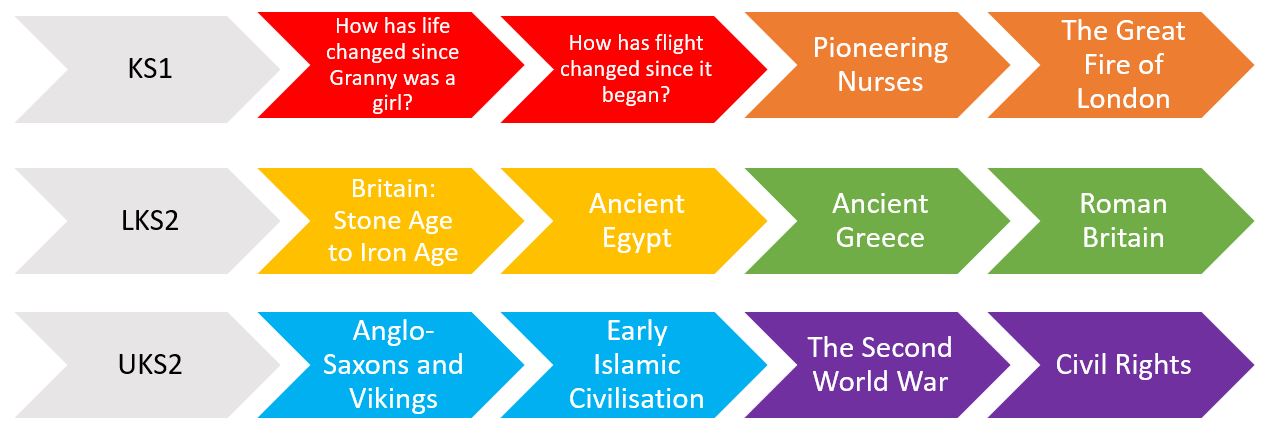‘A high-quality history education will help pupils gain a coherent knowledge and understanding of Britain’s past and that of the wider world. It should inspire pupils’ curiosity to know more about the past. Teaching should equip pupils to ask perceptive questions, think critically, weigh evidence, sift arguments, and develop perspective and judgement. History helps pupils to understand the complexity of people’s lives, the process of change, the diversity of societies and relationships between different groups, as well as their own identity and the challenges of their time.’
National Curriculum, 2014
In EYFS, History is introduced and taught within a topic-based approach. Between Year One and Year Six, pupils study two History units a year, in tandem with Geography, for one afternoon each week. We have chosen to study fewer units of History in more depth, with opportunities to extend pupils’ understanding; and to read, write, debate and present as historians. There is one additional ‘project’ in History in Year Three, focusing on the industrial history of our region, and one additional Geography and History ‘project’ in Year Five focusing on St Aidan’s Nature Reserve. Each year, pupils will go on a school trip that is linked to History.
KS1 units of work gradually expand children’s understanding of the past through from their own lives and the lives of their families to key events and people over the past five hundred years.
KS2 units of work move chronologically from Prehistoric Britain to the twentieth century. Often, a world history unit is taught directly after a unit of concurrent or related British History. History is often used as a stimulus for quality writing in English lessons, and children will also have ample opportunities to read and write as historians during their History lessons. Some core texts in our reading spine are set in historical contexts and are studied after the relevant unit in History, so that pupils approach reading with sufficient prior knowledge.

Underpinning each unit of work is a core body of knowledge that is systematically taught, revised and revisited at distance to ensure that learning is committed to long-term memory. As historians, children will constantly revisit these five key second-order concepts:
- chronology and narrating the past;
- recognising patterns, trends, similarities and differences;
- using appropriate vocabulary, both substantive and disciplinary;
- asking and answering appropriate questions and enquiries;
- recognising, using and interpreting sources of evidence and information.
When deciding which aspects of History to teach, we refer to seven core themes - concepts in our History curriculum that children encounter in multiple contexts over time. This ensures that we are teaching history through lots of lenses and give children a broad scope of the subject, and that children learn concepts that they are able to compare between units:

Our curriculum model is influenced by the resources provided by our strategic partner, The Reach Foundation, ensuring that we meet or exceed the ambition of the National Curriculum for KS1 and KS2. We are fortunate to have worked alongside History education consultants and Historic England in the planning and implementation of our curriculum. We consult with Brigshaw High School to ensure smooth progression between KS2 and KS3. We use booklets (Y2-6) and knowledge organisers in History to ensure that staff and pupils are clear about the knowledge and skills that are being taught.
Parents are kept up-to-date with our work in History via class dojo, knowledge organisers sent home at the beginning of each unit and class curriculum newsletters. Keep an eye out for suggestions for home learning and websites!
Teachers use formative assessment (e.g. quizzes, marking) to check how well content has been understood and remembered. Summative assessment, in the form of an essay or an essay plan, allows children to demonstrate multiple strands of learning from across the unit to build a Historical enquiry. We use ‘Carousel’ quizzes multiple times a year to check how well ‘fingertip knowledge’ in foundation subjects has been remembered. This informs structured retrieval practice in the subsequent unit.
For more information about our History curriculum, please speak to Mr Asquith and Mr Spence.
